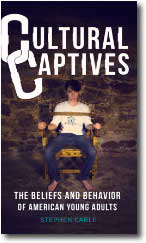More Cultural Research from Steve Cable
In our first post, we discussed the distressing rise of “nones,” those who select for their affiliation no religion at all, among our emerging adults (18- to 29-year-olds). As of 2014, over 35% of emerging adults classify as “nones.” Some distinguished scholars have suggested that a large percentage of “nones” are actually Christians who just have an aversion to identifying with a particular religious tradition.
 This position seems somewhat odd since the GSS survey, for example, has only four choices that reflect a Christian traditionProtestant, Catholic, Orthodox Christian, and Christian. None of those four are very specific as to one’s religious beliefs.
This position seems somewhat odd since the GSS survey, for example, has only four choices that reflect a Christian traditionProtestant, Catholic, Orthodox Christian, and Christian. None of those four are very specific as to one’s religious beliefs.
But we have another way to see if these “nones” are either actually involved, practicing Christians, or are truly wanting to distinguish their beliefs from those of Christianity. Using the GSS survey taken in 2014, we can probe this question to find answers. First, how many of the “nones” in this survey say they actually attend a church at least once a month? The answer is less than 7% of them.
Second, how many of these “nones” say they believe in a God, believe that the Bible is the inspired word of God, and believe that there is life after death? The answer is about 12% of them.
Third, how many of these “nones” attend a church and have the three beliefs listed above. The answer is about 1%, or 1 out of every one hundred young adults not identifying as practicing Christians.
These three answers make it very clear that the increase in “nones” among emerging adults is not a result of them avoiding association with a particular religion. It is clear that the vast majority of “nones” are disassociating themselves from organized religion and from basic Christian doctrine as well.
Note: What about the “nones” who select “nothing at all” as their religious preference as opposed to those who claim they are atheists or agnostics? Perhaps, these “nothing at alls” simply do not want to identify with a specific Christian tradition. Well, the 2014 Pew survey indicates that two-thirds of the “nones” fall into this “nothing at all” category. So, if all of the positive answers to the three questions above were given by “nothing at alls,” their percentages would be 10%, 18% and 2% respectively.
So, again it is very clear that the vast majority of “nothing at alls” have broken away from organized religion and mere Christian doctrine. Most are not, as some scholars suggest, young believers keeping their identity options open.
Acknowlegements:
The Pew Research Center Religious Landscape Study interactive tool, located at http://www.pewforum.org/religious-landscape-study/ is the source of our data from the 2014 Pew survey.
General Social Survey 2014 conducted by the National Opinion Research Center (NORC). The data were downloaded from the Association of Religion Data Archives, www.TheARDA.com, and were collected by Tom W. Smith of the NORC.